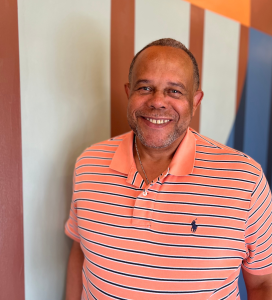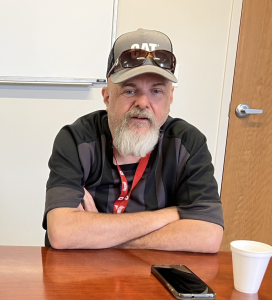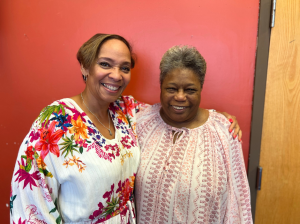This story appeared in the Columbus African American News Journal.
Every journey to recovery is as unique as the individual taking it.
For many, Recovery Month serves as a reminder that healing from substance use or mental health challenges isn't one-size-fits-all — it’s about recognizing the personal experiences, needs and strengths that make up each individual. At the heart of this approach is person-centered care, a philosophy that honors the individual as the expert of their own recovery, ensuring that the care they receive is tailored to their specific circumstances, goals and values.
In Franklin County, the Alcohol, Drug and Mental Health Board of Franklin County (ADAMH) funds community behavioral health care agencies that embody this philosophy, including Community for New Direction and the Africentric Personal Development Shop. Both providers offer personalized and compassionate substance use disorder (SUD) recovery services that meet clients where they are.
Recovery starts with building relationships
John Dawson, CEO of Community for New Direction (CND), constantly reminds himself and others that every person with SUD or alcohol use disorder or every person living with mental illness was born a child who did not grow up asking to be what they became.

“I'm looking at the human being and I'm trying to help them figure out what options they want to take,” Dawson said. “We don't tell people how to live life and what should be important. We want to help create and improve a person who can make good choices for themselves.”
CND provides mental health and substance use disorder treatment services for adults, prevention and leadership training for youth and violence intervention to youth and young adults.
Through its comprehensive mental health and SUD services, CND assists clients with achieving abstinence, gaining employment, reuniting with their families and children and more. Depending on the individual, helping them reenroll in school or scheduling doctor’s appointments is a part of their recovery plan, too.
“We don't have expectations that are the same for all,” Dawson said. “If we can educate clients on the harms and dangers of their substance use, if we can get them to commit to reducing their use, then we're increasing their chance of living, and it's giving us more time to get them to a place where abstinence is important.”
In order to service their clients to the fullest, Dawson said building relationships is key to CND’s work.
“We take the time to get to know the person, and from knowing the person and building trust, they tell us more than what they would have told someone else, which then allows us to assist them in a broader way,” he said. “That's what really makes us a client-centered treatment facility.”
Harry Johnson believes the relationships he’s developed with CND staff have been instrumental in his recovery.

“I consider CND family,” he said. “I 've been with them for about four and a half years and I've had my ups and downs, but at least I keep trying.”
When Johnson got connected with CND, he joined the agency’s six-month recovery housing program for his SUD. Still on his recovery journey, Johnson credits CND's staff, programs and support groups for showing him he didn’t have to face it alone.
“I still deal with paranoia and sometimes I’m afraid to be around or in front of people, but I try to have a good outlook on life, and that’s thanks to CND,” he said.
Johnson's gratitude toward CND highlights the importance of feeling supported throughout recovery. At CND, the staff's commitment to creating a relatable and comfortable environment plays a crucial role in this process.
“There’s always a staff member here who looks like the client, who talks like them or has some type of identification with them because we want everyone to feel comfortable as they go through treatment,” Dawson said.
Tailoring treatment to clients’ needs
The Africentric Personal Development Shop (APDS) also knows how important a sense of relatability is to a client’s willingness to be treated. Carol Stegall, APDS senior clinician, said most of the agency’s SUD counselors have personal experience dealing with an SUD themselves.

“I think clients connect easier with somebody who has had that lived experience,” she said. “Sometimes I will share some of my experiences with clients just to let them know that I’ve walked down a similar road with similar struggles, but I overcame them. It may take something different for them to overcome, but recovery is possible.”
APDS is a behavioral health care agency specializing in prevention, treatment and recovery of substance abuse, domestic violence intervention education and personal development programs.
The agency offers non-intensive and intensive SUD programming. Many APDS clients enroll in the agency’s 13-week education, intervention and treatment program. It covers everything from what addiction is and how it affects every area of their life, to understanding their triggers and how there’s a correlation between anger and substance use.

“It's not realistic to think that all of the stuff they’ve learned about using drugs is going to be undone in 13 weeks,” Stegall said. “The program is just to get them familiar enough with the alcohol and drug addiction cycle and where they are in that process so they can make a decision about what to do about it.”
Through intakes and assessments, APDS further individualizes a client’s recovery by understanding their medical, psychological and even spiritual history so the agency can determine the right programming for a client’s specific patterns or behaviors.
“Nobody's situation is exactly the same,” said Laura Chunn, APDS chief clinical officer. “The program has so many facets, but they're not set in stone. They are adaptable and they are tailormade.”
At APDS, even the smallest steps toward recovery are celebrated. To Stegall and Chunn, a person just needs to decide to show up for themselves.
“Come in and talk to me about what you're looking for,” Chunn and Stegall said. “Maybe we can help, maybe we can’t, but we want you to know that we acknowledge the fact that you took the step to walk through those doors.”
For more information about CND, visit www.cndcolumbus.org or call 614-252-4941. For more information about APDS, visit www.apdsinc.org or call 614-253-4448.
If you or a loved one is experiencing thoughts of suicide or are in crisis, call, text or chat the 988 Suicide & Crisis Lifeline immediately.
